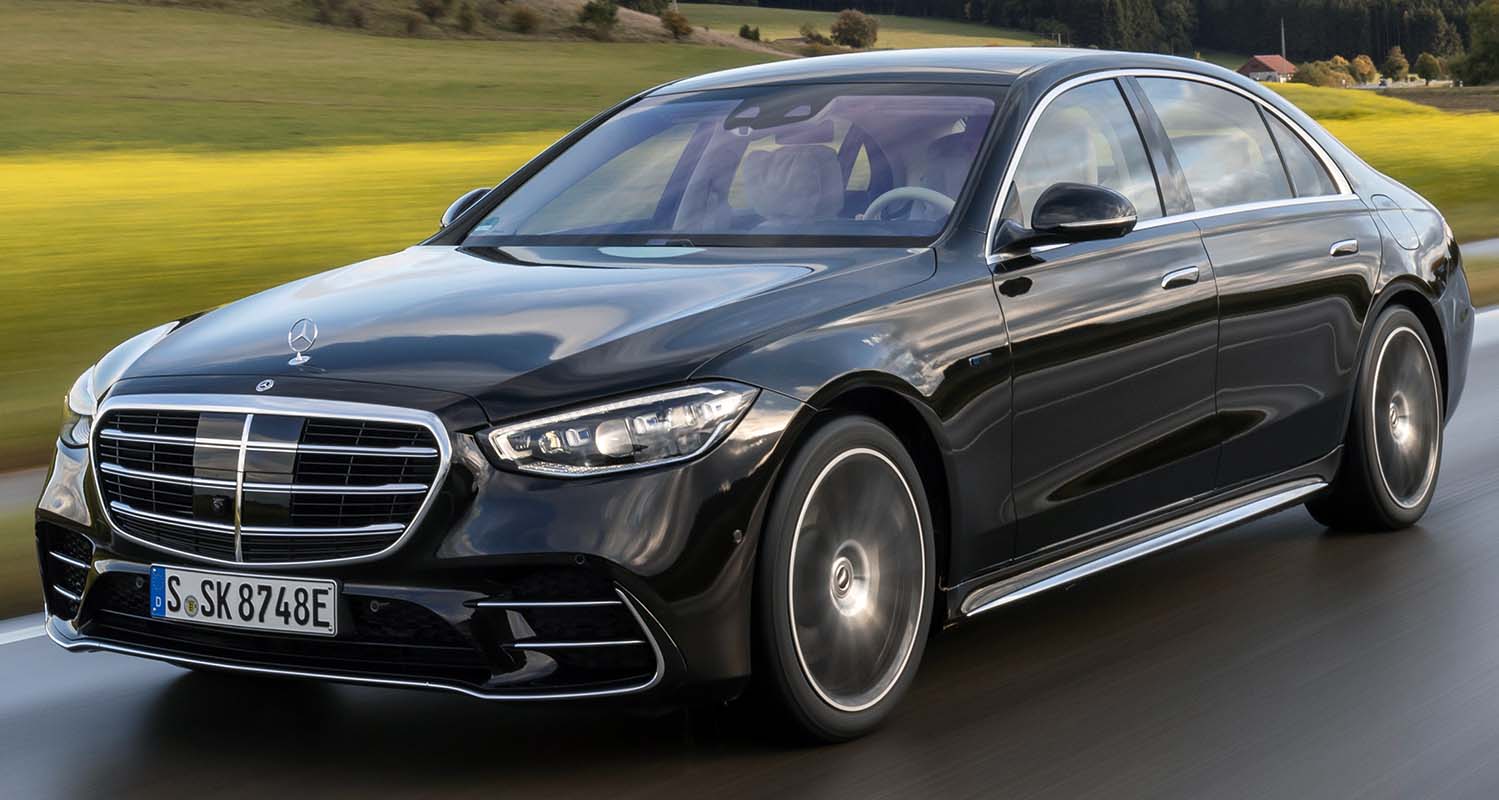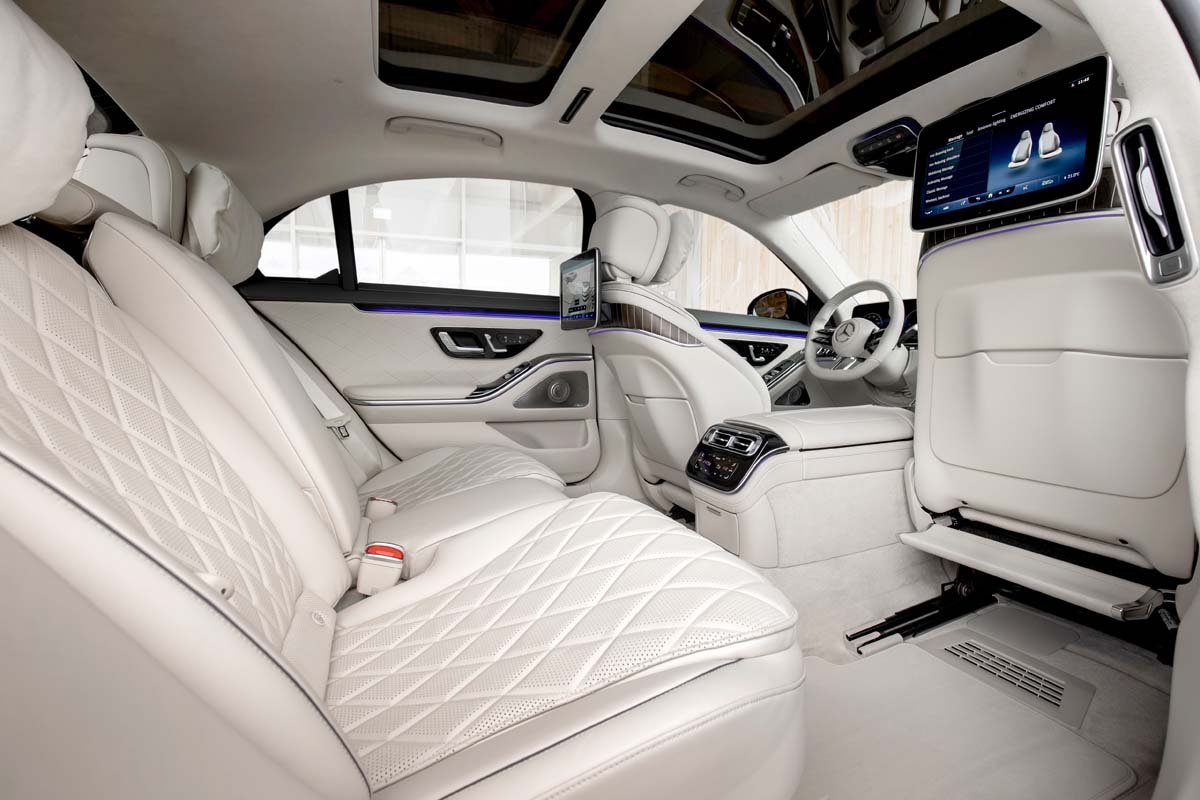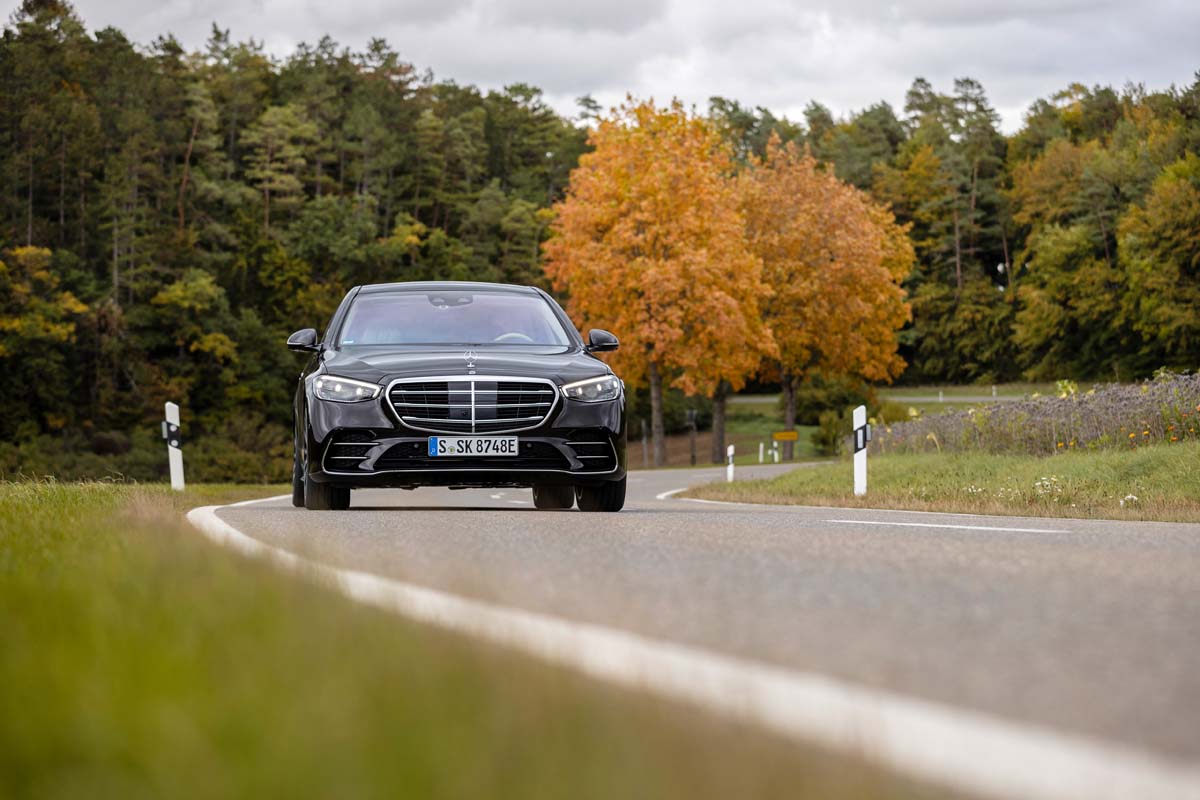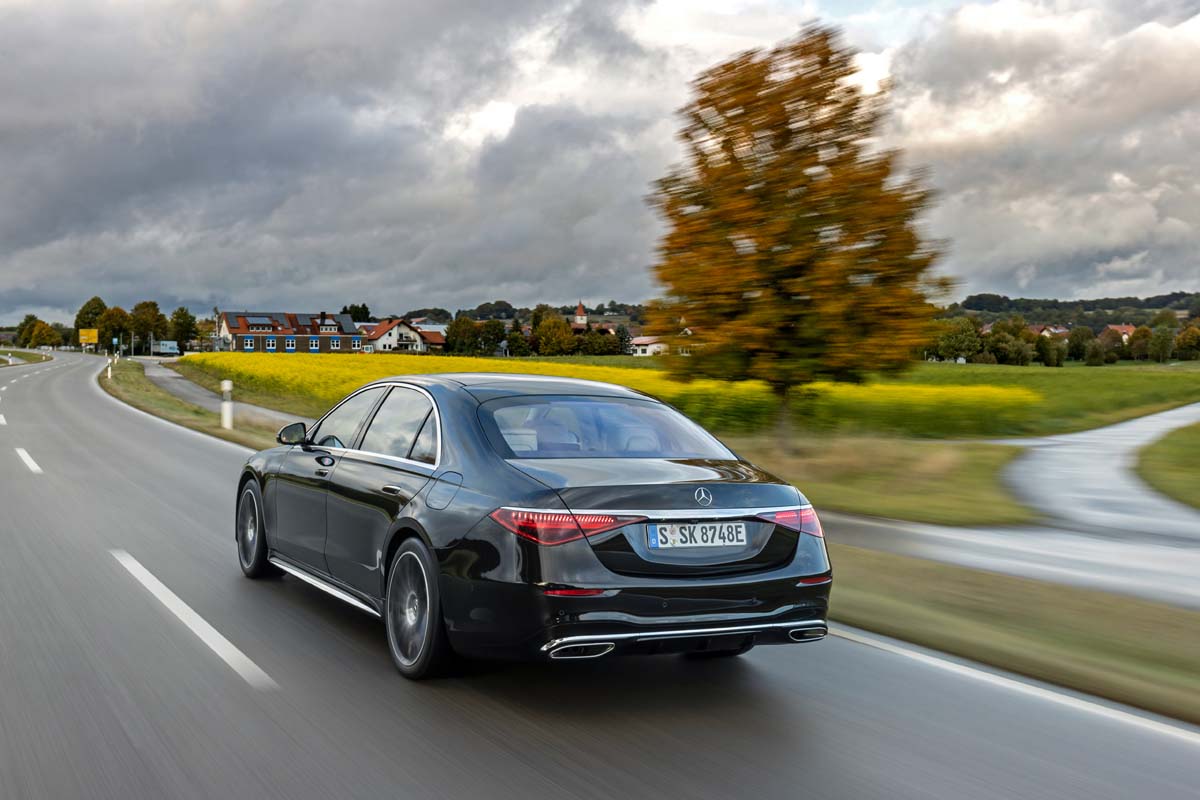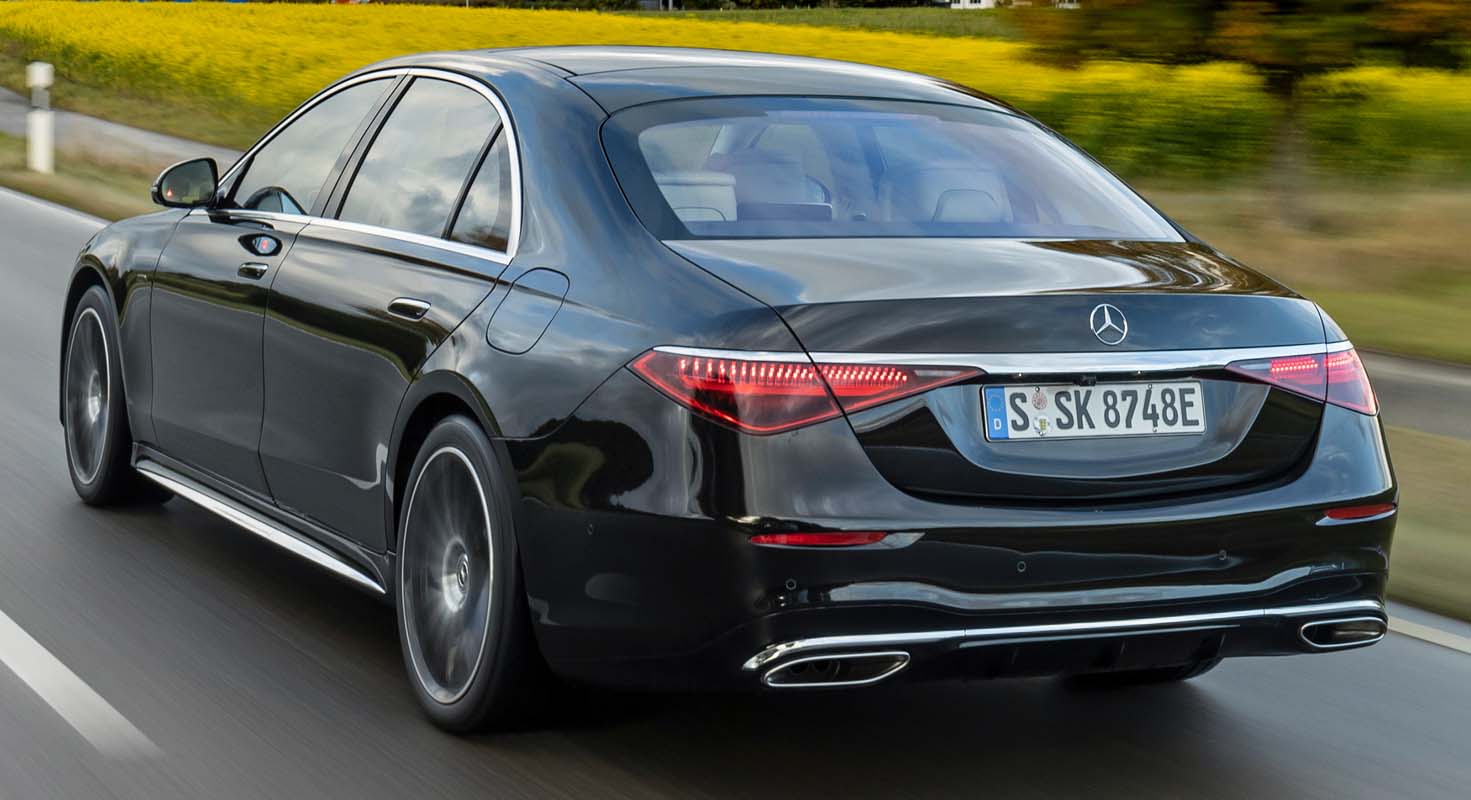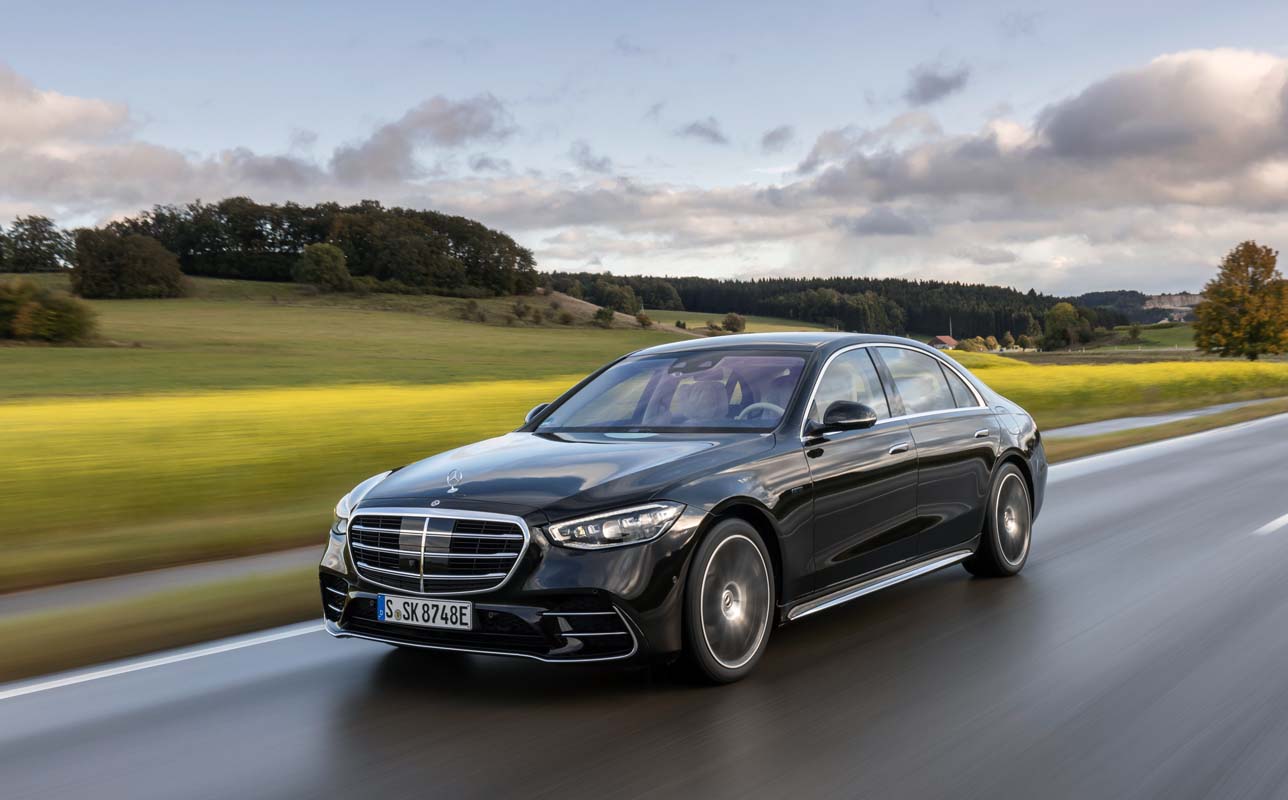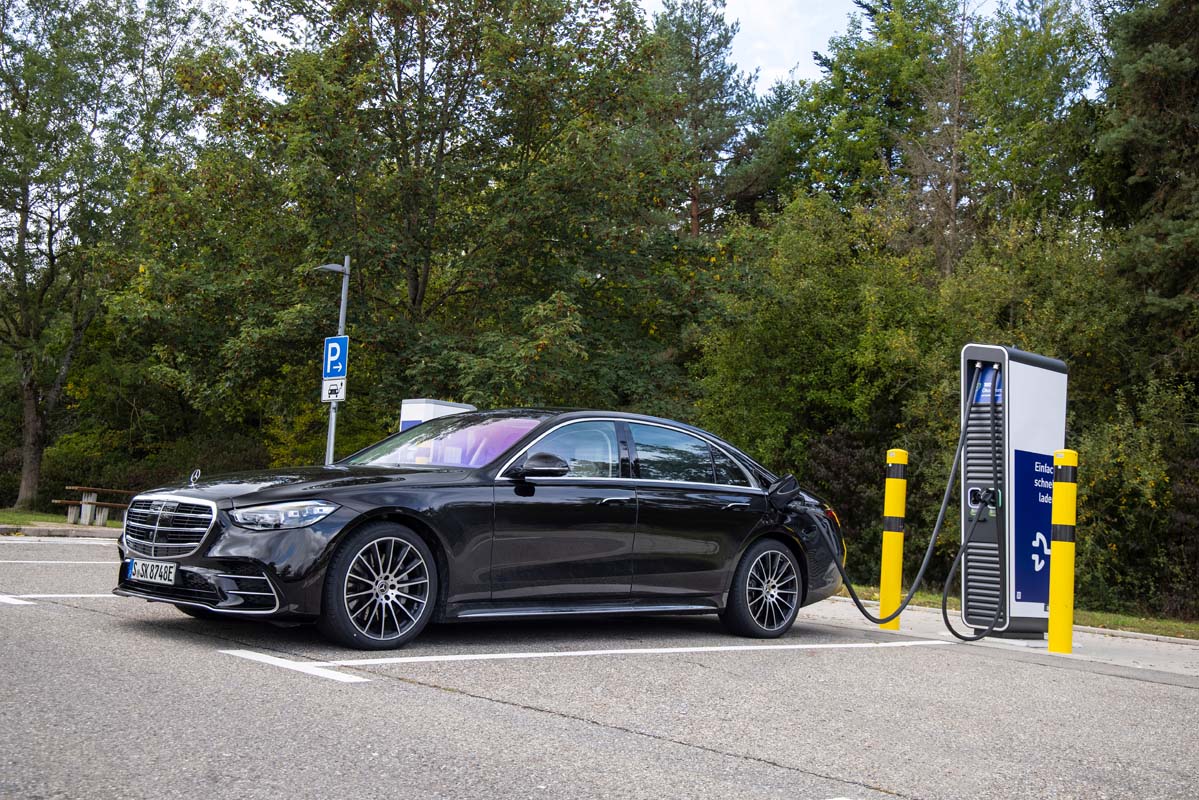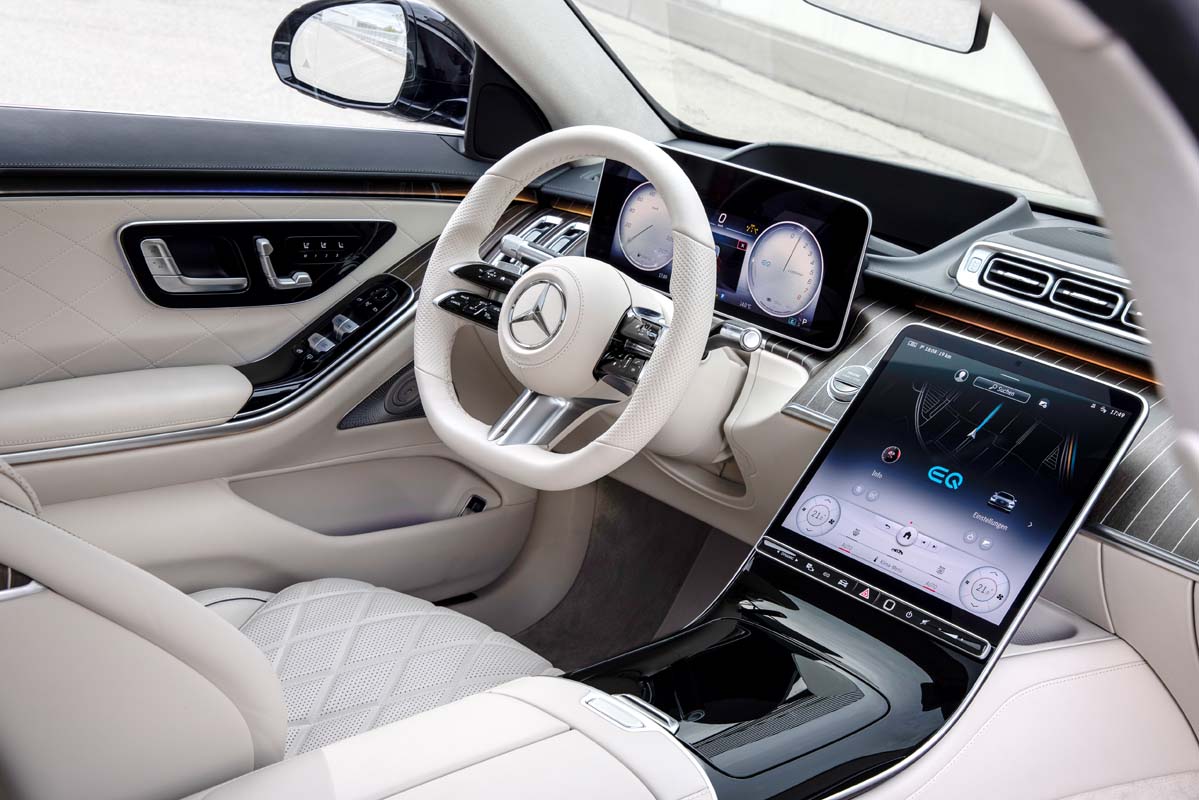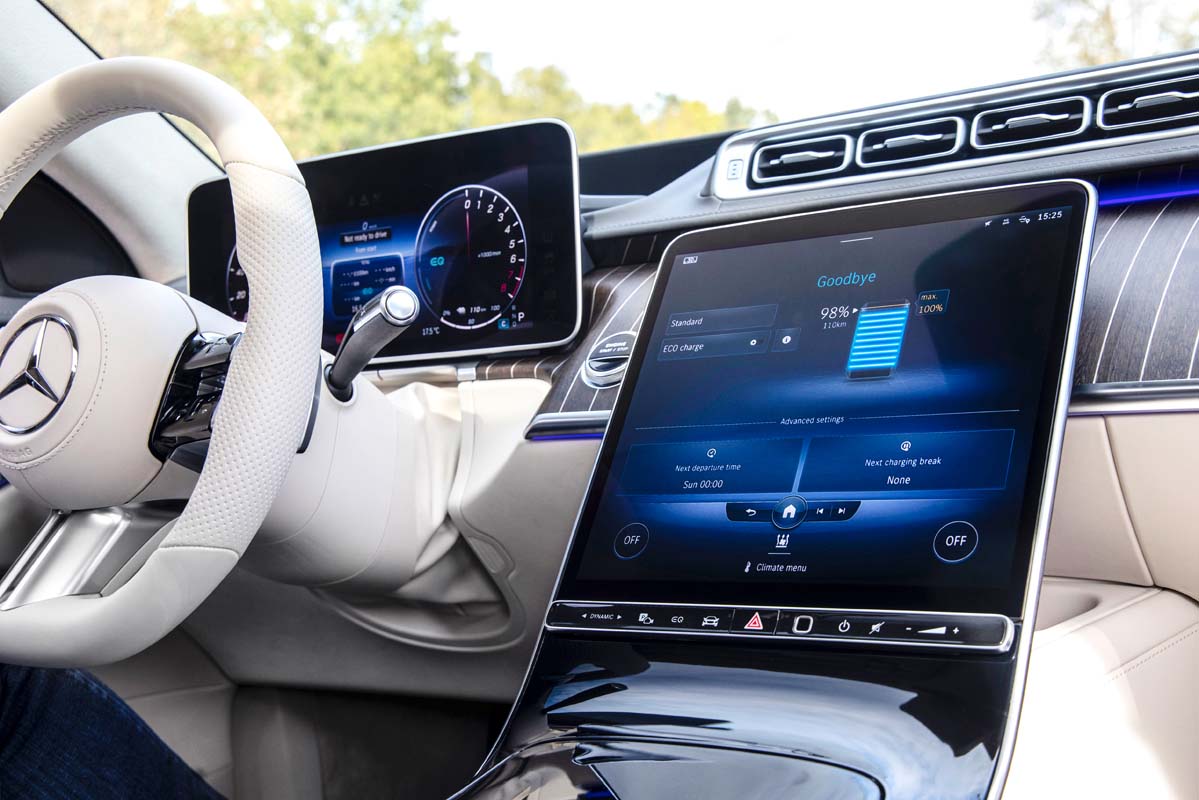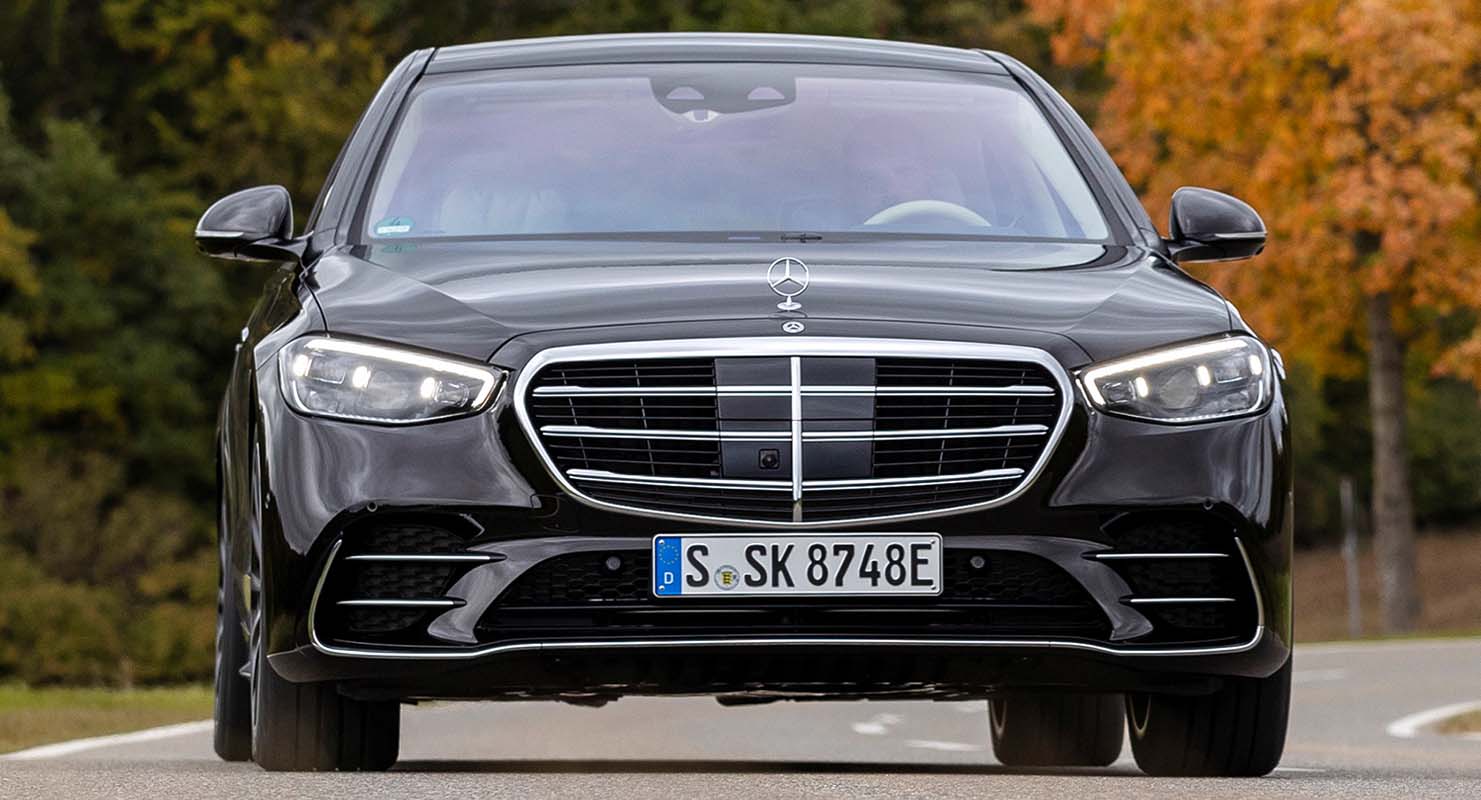
With the S 580 e (combined fuel consumption: 1.5-1.1 l/100 km, combined CO2 emissions: 33.0-26.0 g/km, combined electrical consumption: 22.0-20.2 kWh/100 km)[1] the fourth generation of the hybrid drive system is now celebrating its premiere in the S-Class. The plug-in hybrid is available to order, in both short and long wheelbase versions, with price starting at 123,736 euros[2]. The range of engines has just recently been enhanced by the addition of the mild hybrid S 580 4MATIC (combined fuel consumption: 10.6-10.0 l/100 km, combined CO2 emissions: 242-228 g/km)[3]. This V8 petrol engine with integrated second-generation starter-generator and 48-volt on-board electrical system is also available with both wheelbases, with prices starting at 126,366.10 euros2. For the modification year, Mercedes-Benz has upgraded the equipment of its flagship. The E-ACTIVE BODY CONTROL active suspension is now available. Also new safety and comfort options that are already familiar from the Mercedes-Maybach S-Class. For example the MBUX Interior Assistant and the seat belt feeder for the rear.
With an electric output of 110 kW/150 hp and an all-electric range of over 100 kilometres (WLTP), the S 580 e can in many cases operate without using its combustion engine. The range has more than doubled compared with the previous model. The basis for the hybrid drive system is provided by the six-cylinder in-line M 256 engine with 270 kW/367 hp from the current generation of Mercedes-Benz engines. The high power density of the hybrid traction head is achieved using a permanently excited synchronous motor with internal rotor. The peak torque of the electric motor, at 480 Nm, is available right from the start, resulting in high agility when moving off, along with dynamic driving performance. The top speed in the ELECTRIC drive program is 140 km/h, after which the speed is softly limited. The positioning of the battery in the vehicle brings advantages on a day-to-day basis compared with the previous model: the luggage compartment no longer has a step and offers a through-loading facility.
An 11 kW charger is on board as standard for three-phase charging from the AC grid, while a 60 kW DC charger is available for fast charging with direct current. Even with an empty battery, a full charge can be achieved in around 30 minutes.
New safety and comfort features for the rear
The Load Compartment Package is standard on all S-Class Saloons and makes loading easier. HANDS-FREE ACCESS makes it easy to open the boot with a kicking motion under the rear apron. Thanks to the through-loading option, there is room for bulky or awkward items such as skis. Remote closing of the boot lid works conveniently at the touch of a button.
Nautical blue metallic, designo cashmere white magno, designo kalahari gold metallic and designo selenite grey magno are the names of the new paints. Prices: between 880.10 and 5331.20 euros2. And: for the centre console, there is now also the option of a black dotted lines crystal-look finish (345.10 euros)2.
The optional E-ACTIVE BODY CONTROL active suspension offers more driving comfort and agility. It is combined with the standard AIRMATIC air suspension. Since the system regulates the spring and damper forces on each wheel individually, it not only counteracts roll, but also pitching and lifting movements. Innovative features include the ability to raise the body in the event of a side crash. E-ACTIVE BODY CONTROL (can be ordered for 7735 euros)2, in conjunction with ROAD SURFACE SCAN and the CURVE cornering function, delivers a high level of comfort. As E-ACTIVE BODY CONTROL operates on 48 volts, this optional extra is available for those models equipped with an on-board electrical system of this type and 4MATIC, i.e. for the S 450 4MATIC (combined fuel consumption: 8.6-8.0 l/100 km, combined CO2 emissions: 196-182 g/km)3, the S 500 4MATIC (combined fuel consumption: 8.6-8.0 l/100 km, combined CO2 emissions: 196-183 g/km)3 and the new S 580 4MATIC.
“Pre-installation for digital key transfer” is the name of a new service from Mercedes me. It makes the S-Class ready for car sharing, for example with family or friends. The owner can unlock the vehicle remotely via an app. A spare key stored in the interior is then temporarily activated, and the borrower can start the vehicle.
At the same time, new rear seat safety and comfort options that are already familiar from the recently launched Mercedes-Maybach S-Class can be found here:
- The MBUX Interior Assistant in the rear (523.60 euros)2 can detect the presence of passengers in the second seat row. In this case the head restraints extend automatically. Intuitive hand gestures can be used to control the rear roller sun blind in the panoramic sliding sunroof. This is available in conjunction with the MBUX Interior Assistant in the front (642.60 euros)2 and can be combined with all interior colours except Exclusive nappa leather upholstery in silver grey/black.
- The automatic seat belt feeder (357 euros)2 in the rear indirectly prompts you to fasten your seat belt and makes it more comfortable at the same time. It is no longer necessary to move from an adopted, comfortable seating position to fasten the belt. The seat belt feeder is integrated into the adjustable backrest of the seat and is therefore always in the correct position in relation to the passenger. This extra is available in conjunction with electrically adjustable rear seats including memory function (1856.40 euros)2.
- The adaptive rear compartment lighting (345.10 euros)2 allows the brightness and colour temperature of the interior lighting to be adjusted in several stages. LED spotlights are adjustable in position and size, allowing use for reading or as lounge lighting
- Thecalf massage function in the rearstimulates the circulation and helps to prevent fatigue. This comfort function is included if the customer orders Executive seats (1249.50 euros)2 for the S-Class with long wheelbase.
The new models and prices:
| S 580 e[4] | S 580 4MATIC |
||
| Cylinders, petrol engine (arrangement, number) | inline/6 | V8 | |
| Displacement, petrol engine | cc | 2999 | 3982 |
| Rated output, petrol engine | kW/hp | 270/367 | 370/503 |
| at | rpm | 5500-6100 | 5500 |
| Rated torque, petrol engine | Nm | 500 | 700 |
| at | rpm | 1600-4500 | 2000-4000 |
| Rated output, electric motor | kW/hp | 110/150 | 15/20 |
| Rated torque, electric motor | Nm | 480 | 200 |
| System output | kW/hp | 375/510 | – |
| System torque | Nm | 750 | – |
| Combined fuel consumption1 (NEDC) | l/100 km | 1.5-1.1 (1.5-1.2) |
10.6-10.0 |
| Combined CO2 emissions1 (NEDC) | g/km | 33.0-26.0 | 242-228 |
| Combined electrical consumption, weighted1 (NEDC) | kWh/100 km | 22.0-20.2 (22.0-20.3) | – |
| Electric range1 (NEDC) | km | 104-121 | – |
| Electric range1 (WLTP: EAER comb.) | km | 94-113 | |
| Acceleration 0-100 km/h | s | 5.2 | 4.4 |
| Top speed | km/h | 250 | 250 |
| Top speed, electric | km/h | 140 | – |
| Price2 from | euros | 123,736 (127,425.20) |
126,366.10 (130,055.50) |
The consuption values and CO2 emissions as per WLTP:
| S 580 e4 | S 580 4MATIC |
||
| Combined fuel consumption[5] (WLTP) | l/100 km | 1.0-0.6 | 11.3-9.9 (11.4-10.0) |
| Combined CO2 emissions5 (WLTP) | g/km | 22.0-14.0 | 256-226
(258-227) |
| Combined electrical consumption, weighted5 (WLTP) | kWh/100 km | 25.3-21.2 (25.6-21.3) | – |
[1] The stated figures are the measured “NEDC CO2 figures” in accordance with Article 2 No. 1 Implementing Regulation (EU) 2017/1153. The fuel consumption figures were calculated based on these figures. Electricity consumption [and range] was [were] determined on the basis of Regulation 692/2008/EC. The WLTP figure is relevant for the assessment of the motor vehicle tax.
[2] All prices in this press information are recommended retail prices for Germany and include 19% VAT.
[3] The stated figures are the measured “NEDC CO2 figures” in accordance with Article 2 No. 1 Implementing Regulation (EU) 2017/1153. The fuel consumption figures were calculated based on these figures. The WLTP figure is relevant for assessment of motor vehicle tax in Germany.
[4] Alternative figures for the S-Class with long wheelbase (V 223) in brackets
[5] The stated figures are the measured “WLTP CO₂ figures” in accordance with Article 2 No. 3 Implementing Regulation (EU) 2017/1153. The fuel consumption figures were calculated based on these figures.
